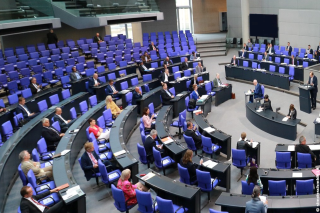In many Western European states, right-wing populist parties are now present in the national parliament. This poses some challenges for the established parties: How should they deal with the new party? Research to date has focused mainly on the interaction with populist radical right parties during electoral campaigns. Less is known about how this functions in an institutionally constrained environment like parliament. In a recent study, Jan Schwalbach (formerly at the Cologne Center for Comparative Politics (CCCP) and currently postdoctoral researcher at GESIS) investigated how party interactions in parliamentary debates were structured after the entry of right-wing populist parties. Thus, he combined findings from research on the dynamics during campaigns with theoretical assumptions about the effects of the institutional framework in parliament.
For his research, Jan Schwalbach analysed parliamentary debates in Denmark, Sweden, the Netherlands and Germany. The speeches were scraped and annotated from the parliamentary websites for this purpose. The corresponding datasets (including further countries) are freely available in the ParlSpeech dataset. The basis of the analysis was a quantitative text analysis, which allows to derive positions from political texts. Jan Schwalbach used a correspondence analysis combined with a dictionary approach to measure interaction and polarisation in parliament.
The results show: The assumptions from party competition during electoral campaigns cannot be transferred to the parliamentary arena. Parliamentary debates mostly continue to follow a government-opposition structure after the entry. However, in debates on immigration, a polarisation between the new challenger and all other parties is apparent. Moreover, right-wing populist parties become the centre of these debates, as they are disproportionately often addressed directly by the other parties.
